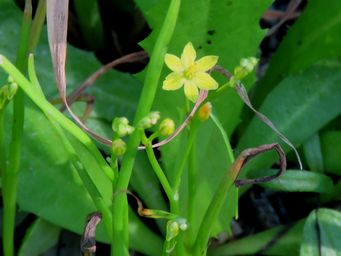Australia So Much to See
Copyright (C) 2013 AustraliaSoMuchtoSee.com. All rights reserved


Sources used for identification of wildflowers shown on these pages and regions where they occur see Credits
These pages will
feature some of the wildflowers we have photographed in Western Australia, and where possible, identified. If you
are able to help identify further flowers, or correct any I may have wrong, please contact us.
Information given for each species
will give botanical name, known common names, describe the flower, give time of year it flowered, and where it was photographed, and
the areas it occurs in. Names have been matched to Florabase which has also been used to show distribution.
See some
of these wildflower in larger sized photos on our Flickr pages.
Burchardia multiflora, Dwarf Burchardia
White, six petals, pink centre, several flowers on branching stems of medium length.
White, six petals, pink centre, several flowers on branching stems of medium length.
Spring
Bridgetown, South West Region, Western Australia and occurs from North of Perth to Albany through the Mid West, Perth, South West and lower Great Southern Regions and extends into the Wheatbelt
Bridgetown, South West Region, Western Australia and occurs from North of Perth to Albany through the Mid West, Perth, South West and lower Great Southern Regions and extends into the Wheatbelt
Kennedia prostrata in background

Brunonia australis Brunonia Blue, Native Cornflower, Blue Pincushion
A single mid blue pompom head on stem. Shades can vary in different
areas. Spring
Mullewa, Mid West Region, Western Australia and found through the Mid West, Wheatbelt, Northern Great Southern,
Northern Goldfields, Pilbara and inland desert regions.


Burchardia congesta (formerly Burchardia umbellata) Burchardia, Milkmaids, Kara
White, six petals, cluster on a long stem
Spring
Bridgetown, South West Region, Western Australia and occurs from Geraldton to Albany through the Mid West, coastal Wheatbelt, Perth, South West and lower Great Southern Regions.
White, six petals, cluster on a long stem
Spring
Bridgetown, South West Region, Western Australia and occurs from Geraldton to Albany through the Mid West, coastal Wheatbelt, Perth, South West and lower Great Southern Regions.

Burchardia monantha
White with touches of purple, six petals, usually one flower per long stem
Spring
Bridgetown, South West Region, Western Australia and occurs in parts of the South West Region from Boddington south to Denmark including adjacent parts of the Great Southern Region.
White with touches of purple, six petals, usually one flower per long stem
Spring
Bridgetown, South West Region, Western Australia and occurs in parts of the South West Region from Boddington south to Denmark including adjacent parts of the Great Southern Region.



Brachychiton viscidulus, Kimberley Rose, Sticky Kurrajong
Red trumpet shaped cluster of flowers on a large deciduous Kurrajong tree
Red trumpet shaped cluster of flowers on a large deciduous Kurrajong tree
Winter (dry season)
Charnely River Station, Kimberley Region, Western Australia and found through much of the Kimberley Region
Brachyscome ciliocarpa is now known as Roebuckiella ciliocarpa, and can be seen under R
Brachyscome iberidifolia, Swan River Daisy
Very small daisies with a yellow centre and petals which can occur in a variety of shades
including white, with purple being the one most identified with Swan River Daisy. The small plant has lacy foliage as can be
seen at lower left, and the flower has around thirteen petals but can have more or less. In this instance, as at lower left,
the white flowers and their plants are slightly larger than the purple ones.
October
Bridgetown, South West Region, Western Australia
and occurring through most of the state with the exception of the far north and easternmost areas. Predominantly found
through the Perth, South West, Great Southern and Wheatbelt regions



F

The common name of Native Cornflower is a very loose description, as Brunonia is really a cluster of blue five fingered fan flowers.
It is a member of the Goodeniaceae family, as is the fan flower Scaevola.
The Cornflower, Centaurea cyanus, is a
circle of tubular flowers in a similar shade of blue in the Asteraceae (Daisy) family.

Bulbine semibarbata, Native Leek; Leek Lily, Wild Onion
A small six petalled yellow flower, with up to 35 flowers growing on an upright
stem which may reach to fifty centimetres tall. Stamens are erect. Anthers at the tip of the stamen are red or orange
and three anthers only are very fluffy around tip (the name semibarbata meaning half beared).
August, and
can be found flowering between July and December
Merredin, at the base of a granite outcrop, favouring this and other damp environments. Can be found in the Gascoyne, Mid West, Wheatbelt, South West, Great Southern and Goldfield regions. It is also found in all
other states, apart from Northern Territory.